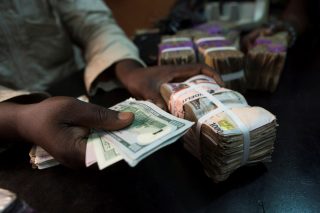Nigeria’s economic outlook has been revised from stable to negative by Fitch, a global credit rating agency. While affirming the B+ rating, the firm said the downgrade is traceable to the disruptive macroeconomic policies under the current administration.
In a report issued on Thursday, Fitch pointed out a series rating drivers such as the increasing vulnerability from the current macro-policy setting in Nigeria, the central bank’s complex regulatory measures, rising debt, low fiscal revenue, and inflation.
“The outlook revision reflects the increasing vulnerability from the current macro-policy setting, raising risks of disruptive macroeconomic adjustment in the medium term amid continued real appreciation of the naira,” Fitch said.
Further risks stem from the central bank’s complex regulatory measures, which pose challenges to the durability of the current policy setting. According to Fitch, the Central Bank of Nigeria (CBN) is striving to “maintain a stable nominal exchange rate through an array of unconventional and economically costly policy measures.”
Fitch further disclosed that government debt remains on an upward path in Nigeria while particularly low fiscal revenues and public fund mismanagement (PFM) constrain the sovereign’s ability to support a rising debt burden. The rating agency expects the government debt to exceed 30 percent of GDP in 2020, trebling in a decade.
“Weaknesses in PFM are illustrated by rising monetary financing, a large and uncertain amount of government arrears, and a multitude of contingent liabilities on which transparency is poor,” it stated.
As highlighted by Fitch, the downgrade to B+ also reflects litigation with third parties underscoring governance shortcomings which is a source of fiscal risks and the huge debt of the Asset Management Corporation of Nigeria (AMCON) as at end of 2018 which is expected to rise due to high non-performing loans in the banking sector.
In addition, low non-oil fiscal revenues are a key credit weakness and are unlikely to improve significantly in the medium term in light of the slow progress on fiscal reforms as well as inflation which is high and poised to accelerate.
Fitch projects inflation will average 13 percent in 2020-2021 from 11.3 percent in 2019, well above the forecast ‘B’ median of 5 percent. The surge is due to recent policy measures such as the upcoming raise of the VAT rate, significant salary increases after the hike in the minimum wage, the recent closure of land borders to foreign trade and tightening restrictions on FX financing for several imports.
The medium-term economic outlook is subdued. Fitch projects average GDP growth of 2.4 percent in 2019-2021, well below the ‘B’ median of 3.4 percent and the five-year average demographic growth rate of 2.7 percent.
“The prospects for supply-side, fiscal and exchange-regime reforms that could tackle the major constraints for Nigeria’s credit profile are weak,” Fitch said, adding that emerging rivalries within the ruling party, possibly sparked by early dissensions over the 2023 succession to President Muhammadu Buhari, could hamper policy-making.
Why the downgrade matters
Rating agencies such as Fitch provide global investors with information on the ability of corporations and countries to pay back debt, how likely they are to make interest payments on time or to default.
Being downgraded can thus have a big impact on Nigeria’s ability to borrow money on the financial markets (and on the costs) as investors would see it as a riskier bet, therefore demanding higher returns to lend to the government.
Countries that have been downgraded in recent years include South Africa, Brazil, the United States, the United Kingdom and a number of European nations.
Fitch Ratings Inc. is an American credit rating agency and one of the three main global credit rating agencies with the other two being Moody’s and Standard & Poor’s (S&P).
Standard & Poor’s credit rating for Nigeria stands at B with a stable outlook while Moody’s credit rating for Nigeria was placed at B2 with a negative outlook, according to Trading Economics.








